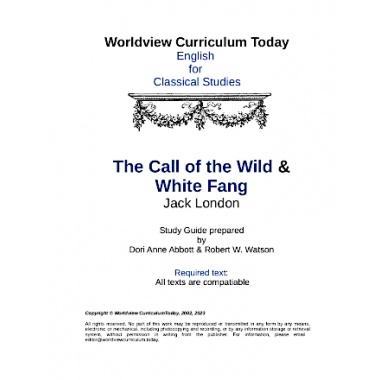The Call of the Wild & White Fang
Number of lessons: 13; compatible text for study guide: all texts are compatible (you may order the text below). Guide prepared by Dori Anne Abbott and Robert W. Watson.Order WHITE FANG text here
Note: This guide is included in the course, An Introduction to Literature.
Before James Bond or Indiana Jones, there was Jack London—real-life adventurer, writer, and traveler to “the raw edges of the world.” The Klondike, the slums of England, South Africa, the South Seas Islands, and the rugged countryside of North Korea were some of his favorite haunts. His many adventures were fueled by his constant reading and an overwhelming desire to hammer out a personal philosophy of life.
London’s most famous stories center on the Alaskan gold rush of 1897. London did not write these stories as documentary narratives, but rather to show what would happen when men and animals were thrust into the wild. The stories you are about to read show London’s respect for men who could survive the “raw edge of the world.” These men overwhelmed London’s imagination, and he began to see them as the ultimate symbols of manly success and their behavior as the code for that success.
The Call of the Wild and White Fang show London’s vision of the Klondike as a laboratory where the animals and men could be reduced to the simplicity of the natural laws of survival. You will notice that the differences between man and animals are often obscured. While London claims White Fang is not a sequel to The Call of the Wild, you will not miss the fact that while Buck comes from a domesticated environment to become wild on the one hand, White Fang comes from the wild and turns domesticated.
Also, be aware of London’s belief in the superhuman since London was an admirer of Friedrich Nietzsche (Nee-chee), a German philosopher, classical scholar, and critic of Christianity. It was Nietzsche who introduced the concept of the “superman,”—a magnanimous hero who rises above biblical morality, whose motivation is the “will to power” that directs his creativity. This “will to power” distinguishes the superman apart from inferior human beings.
You will note the recurring theme of “survival of the fittest.” Obviously, this philosophy is opposed to the Scriptures. But in a world that is under the curse of sin, humans tend to think that “might makes right.” Also, you may note the stories suggest that life is a continual emergency, which it is not. While emergencies happen, life is often mundane and mostly predictable. Human beings do not live their lives in a constant state of “survival mode.”

